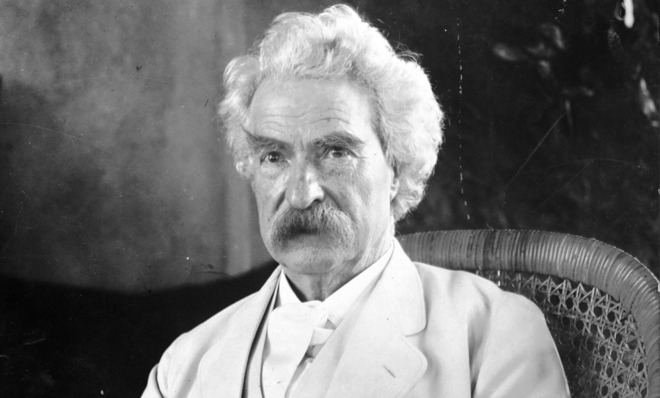8 of our favorite words coined by Mark Twain
There are some real brontosaurian terms in here

A free daily email with the biggest news stories of the day – and the best features from TheWeek.com
You are now subscribed
Your newsletter sign-up was successful

1. bicentennial
Usage of the word bicentennial, meaning occurring every 200 years, has been steadily increasing since the 1880s. The usage rose sharply in the 1970s, probably due to the United State Bicentennial, and then again in the mid-1980s, perhaps due to the bicentennial of the Statue of Liberty.
Example: "New Orleans intended to fittingly celebrate, this present year, the bicentennial anniversary of this illustrious event; but when the time came, all her energies and surplus money were required in other directions, for the flood was upon the land then, making havoc and devastation everywhere."
The Week
Escape your echo chamber. Get the facts behind the news, plus analysis from multiple perspectives.

Sign up for The Week's Free Newsletters
From our morning news briefing to a weekly Good News Newsletter, get the best of The Week delivered directly to your inbox.
From our morning news briefing to a weekly Good News Newsletter, get the best of The Week delivered directly to your inbox.
— Life on the Mississippi, 1883
2. blip
Twain's usage of blip here means "any sudden brisk blow or twitch; a quick popping sound," according to the Oxford English Dictionary (OED), and is probably imitative in origin. The word came to refer to "a spot of light on a radar or sonar screen" around 1945, and the figurative meaning of "a temporary or insignificant phenomenon" in the mid-1960s.
Example: "We took him a blip in the back and knocked him off."
A free daily email with the biggest news stories of the day – and the best features from TheWeek.com
— St. Nicholas, 1894
3. brontosaurian
Brontosaurian here means "of or pertaining to a brontosaurus," says the OED, and therefore figuratively, "antiquated; clumsy, ineffectual." The word gained peak usage in the 1920s, about 10 years after Twain's, before dropping off and gaining some up-and-down frequency from the 1940s through the 1980s before dropping off again.
Example: "Two of these cults are known as the Shakespearites and the Baconians, and I am the other one — the Brontosaurian."
— Is Shakespeare Dead? 1909
4. bug
Bug here meaning "to protrude" might be an alteration of bulge, although one could imagine it meaning having eyes resembling that of a bug.
Example: "Well, sir, his dead-lights were bugged out like tompions; and his mouth stood that wide open that you could have laid a ham in it without him noticing it
— Rambling Idle Excursion, 1877
5. cocoon
Twain's use of cocoon as to mean to wrap in something resembling a cocoon is the earliest recorded. The word cocoon ultimately comes from the Greek kokkos, "seed, berry." Cocoon also has a newer meaning of "to stay inside and be inactive."
Example: "We snatched on a few odds and ends of clothing, cocooned ourselves in the proper red blankets, and plunged along the halls and out into the whistling wind bareheaded."
— A Tramp Abroad, 1880
6. lunkhead
A lunkhead is slang for a stupid person or blockhead. This word may be an alteration of lumphead. The usage of lunkhead far surpasses that of lumphead.
Example: "So the duke said these Arkansaw lunkheads couldn't come up to Shakespeare; what they wanted was low comedy — and maybe something ruther worse than low comedy, he reckoned."
— Adventures of Huckleberry Finn, 1884
7. slim jim
A slim Jim here refers to "a very slim or thin person," and also means anything long, thin, or narrow, such as slim-jim pants or a slim-jim tie. In 1902, says the Online Etymology Dictionary, slim jim referred to a type of "slender cigar," and in 1975 to the meat snack.
Example: "Got it, slim Jim!"
— A Connecticut Yankee in King Arthur's Court, 1889
8. slumgullion
The slumgullion Twain is referring to "a cheap drink." It also means "a watery meat stew" and "offal or refuse of fish of any kind; also, the watery refuse, mixed with blood and oil, which drains from blubber." The word may come from slum meaning "in metallurgy, [the] same as slime," and the dialectal gullion, "mud," which may come from the Irish Gaelic goilín, "pit."
Example: "We could not eat the bread or the meat, nor drink the 'slumgullion.'"
— Roughing It, 1872
More from Wordnik...
-
 ‘This is something that happens all too often’
‘This is something that happens all too often’Instant Opinion Opinion, comment and editorials of the day
-
 House votes to end Trump’s Canada tariffs
House votes to end Trump’s Canada tariffsSpeed Read Six Republicans joined with Democrats to repeal the president’s tariffs
-
 Bondi, Democrats clash over Epstein in hearing
Bondi, Democrats clash over Epstein in hearingSpeed Read Attorney General Pam Bondi ignored survivors of convicted sex offender Jeffrey Epstein and demanded that Democrats apologize to Trump